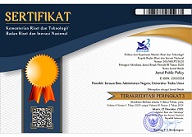Principles of Tax Collection in Value Added Tax (VAT) on Digital Services in Indonesia
Abstract
Indonesia is one of the countries with a high level of consumption of digital services. That potential encourages the government to collect Value Added Tax (VAT) on digital services, including foreign companies. However, in practice, issues related to efficiency and supervision were found. This paper aims to analyze the fulfillment of the principles of tax collection in collecting Value Added Tax (VAT) on digital services. The method used is qualitative with data collection through literature study. The analysis results show that the principle of Equity fulfills horizontal Equity because the fees are charged regardless of ability; Revenue Productivity has succeeded in increasing state revenue; Ease of administration, meets the aspects of certainty, convenience, simplicity, and efficiency. However, in terms of efficiency, it is feared that it could increase compliance costs due to the limited knowledge of PMSE tax. Transparency is not optimal because the absence of a physical presence in Indonesia makes it difficult to access data and information so that supervision is carried out; Neutrality is fulfilled because it supports the competitiveness of local business, while in terms of consumption, it is necessary to pay attention to VAT facilities on digital export services due to the potential for distortion of local digital service providers. So it can be said that the practice of collecting Value Added Tax (VAT) fulfills all aspects. However, several issues need more attention, especially efficiency, transparency, and neutrality.
Keywords
Full Text:
PDFReferences
Ademuwiya, & Adeniran &. (2020). Adapting African Taxation Systems to the Digital Economy.
Alhussain, M. (2020). The impact of value-added tax (VAT) implementation on Saudi banks. Journal of Accounting and Taxation Vol. 12(1), Pp. 12-27, January-March 2020, 12 (1), 12–27.
Arianty, F. (2017). Tinjauan Atas Asas Keadilan dan Kemudahan Administrasi Pajak dalam Pengenaan Pajak Penghasilan Final 1% Terhadap Wajib Pajak UMKM. Journal of Vocational Program University of Indonesia, 5 (1).
Bain Company. (2020). e-Conomy Sea 2020: At full velocity: Resilient and racing ahead.
Bauer, M. (2018). Digital Companies and Their Fair Share of Taxes : Myths and Misconceptions.
Beebeejaun, A. (2020). VAT on foreign digital services in Mauritius; a comparative study with South Africa. International Journal of Law and Management, 63(2), 239–250. https://doi.org/10.1108/IJLMA-09-2020-0244
Feige, E. L. (n.d.). Taxation for the 21st century: the automated payment transaction (APT) tax.
Hafidh Nadhor Tsaqib, P. (2020). Mencari Solusi Keterbatasan AEoI dalam PPN Digital. DDTC News. https://news.ddtc.co.id/mencari-solusi-keterbatasan-aeoi-dalam-ppn-digital-25287
Handoyo. (n.d.). Setoran PPN perusahaan digital tembus Rp 2,01 triliun. https://nasional.kontan.co.id/news/setoran-ppn-perusahaan-digital-tembus-rp-201-triliun
Haula Rosdiana & Edi Slamet Irianto. (2012). Pengantar Ilmu Pajak. https://perpustakaan.mahkamahagung.go.id/slims/pusat/index.php?p=show_detail&id=1146&keywords=
Haula Rosdiana, R. T. (n.d.). Perpajakan Teori dan Aplikasi.
Kim, J. G. (2020). The Digital Economy in Southeast and South Asia : Towards Mutually Beneficial Cooperation with Korea. 2018–2021.
Kusuma, H. (n.d.). Catat, Jenis Produk Digital yang Kena Pajak 10% Mulai 1 Juli. https://finance.detik.com/berita-ekonomi-bisnis/d-5032739/catat-jenis-produk-digital-yang-kena-pajak-10-mulai-1-juli
Liam Ebrill, Michael Keen, Jean-Paul Bodin, and V. S. (n.d.). The Modern VAT. International Monetary Fund 2001, 15–24.
Liana, D. R. P. dan D. (n.d.). OPTIMALISASI PENERAPAN PAJAK PERTAMBAHAN NILAI (PPN) PADA KEGIATAN PERDAGANGAN MELALUI SISTEM ELEKTRONIK (PMSE).
OECD. (n.d.). Mechanisms for the Effective Collection of VAT/GST When the Supplier Is Not Located In the Jurisdiction of Taxation.
Paris, R. (2003). The Globalization of Taxation ? Electronic Commerce and the Transformation of the State. 47(2), 153–182.
Pasquale Pistone, Jennifer Roeleveld, J. H., & João Félix Pinto Nogueira, C. W. (2019). Fundamentals of Taxation: An Introduction to Tax Policy, Tax Law and Tax Administration.
PERATURAN MENTER! KEUANGAN REPUBLIK INDONESIA NOMOR 48 /PMK.03/2020 TENTANG TATA CARA PENUNJUKAN PEMUNGUT, PEMUNGUTAN, DAN PENYETORAN, SERTA PELAPORAN PAJAK PERTAMBAHAN NILAI ATAS PEMANFAATAN BARANG KENA PAJAK TIDAK BERWUJUD DAN/ATAU JASA KENA PAJAK DARI . (n.d.).
PERATURAN MENTERI KEUANGAN REPUBLIK INDONESIA NOMOR 210/PMK. 010/2018 TENT ANG PERLAKUAN PERPAJAKAN ATAS TRANSAKSI PERDAGANGAN MELALUI SISTEM ELEKTRONIK (E-COMMERCE). (n.d.).
Pramesti, I. A. (2019). Pengumuman: Sri Mulyani Tarik Aturan E-Commerce, Batal Semua! https://www.cnbcindonesia.com/tech/20190329160155-37-63738/pengumuman-sri-mulyani-tarik-aturan-e-commerce-batal-semua
Raul, K. (International T. U. (2015). The impact of Taxation on the digital economy.
Sugiyono. (2017). Metode Penelitian Kuantitatif, Kualitatif, dan R&D. Alfabeta, CV.
Thuronyi, V. (n.d.). Tax Law Design and Drafting Editor.
Zídková, H., & Šťastná, A. (2019). VAT collection methods. Acta Universitatis Agriculturae et Silviculturae Mendelianae Brunensis, 67(3), 883–895. https://doi.org/10.11118/actaun201906730883
DOI: https://doi.org/10.35308/jpp.v8i1.4692
Refbacks
- There are currently no refbacks.
Copyright (c) 2022 Putri Andreana
p-ISSN: 2477-5738 I e-ISSN: 2502-0528 I DOI: 10.35308
Jl. Alue Peunyareng, Ujong Tanoh Darat, Meureubo, Kabupaten Aceh Barat, Aceh 23681, Indonesia
(0655) 7110535 l +621260313742 l +6285277110911
 is licensed under a Creative Commons Attribution-ShareAlike 4.0 International License
is licensed under a Creative Commons Attribution-ShareAlike 4.0 International License


